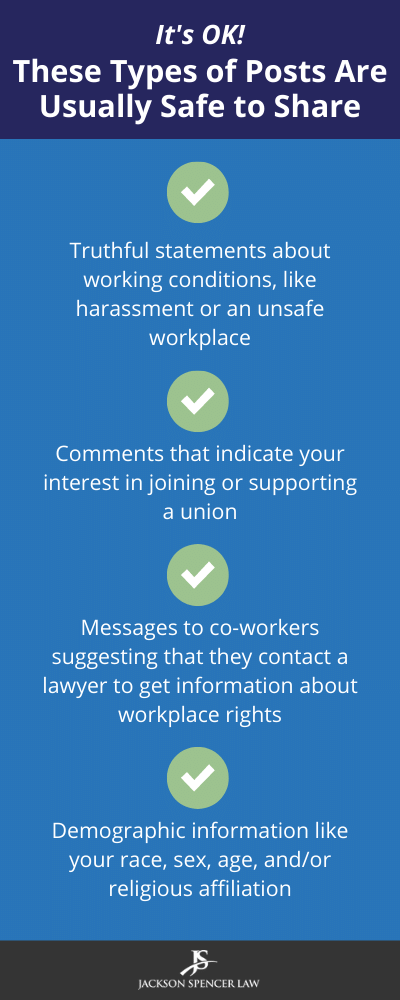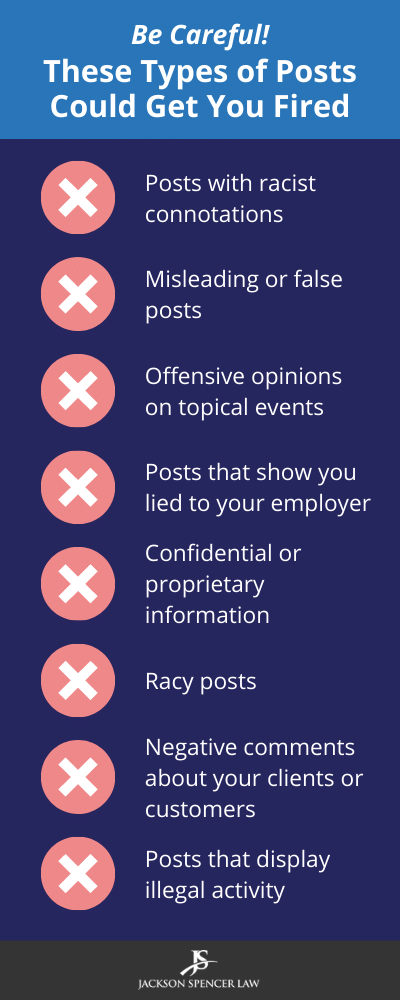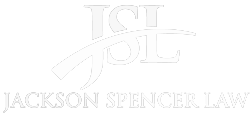The First Amendment of the U.S. Constitution protects you from the government interfering with your speech – meaning you can typically express opinions (even if they are offensive) without being arrested or charged with a crime. But that does not mean you can say whatever you want online without suffering consequences.
It is an oft-cited misconception that freedom of expression (protected by the First Amendment) means you can say whatever you want, whenever you want. Sadly, this myth often leads people to post comments on social media they later regret.
Private companies and employers can discipline or fire an employee for what they post on social media. There are, however, a few exceptions to this rule.

- Truthful statements about working conditions, like harassment or unsafe working conditions.
- Comments that indicate your interest in joining or supporting a union.
- Messages to other co-workers suggesting that they contact a lawyer to get information about workplace rights.
- Demographic information like your race, sex, age, religious affiliation.
In this post, we’ll discuss whether employers can fire you for what you post on social media and give examples of what not to post online. Then we’ll take a brief look at whether criticizing your employer is illegal and what to do with your social media if you’re in the midst of a lawsuit.
Let’s start by answering the most important question, can you actually get fired for what you post on social media?
If you have been experiencing issues at work, such as discrimination, wrongful suspension, or wrongful termination, and have come under fire for a social media post while others have gone unpunished for similar posts, get a free comprehensive assessment with our legal team.

Can I Get Fired for What I Say on Social Media?
In most U.S. states, employers can discipline or fire employees for any lawful reason. Of course, this begs the question: what is lawful and what is not?
It’s easiest to start with a brief discussion of when employers cannot fire or discipline a worker. If you have a contract with your employer that stipulates you can only by fired for cause, you can generally enforce those provisions in court. Examples of cause might include excessive tardiness, missing work, or failing to perform your job in accordance with the contract. You also cannot be terminated for blowing the whistle on unlawful activity (like sexual harassment, discrimination, or crimes in the workplace). Moreover, employees cannot be terminated solely because of their race, national origin, gender, religion, disability, age, or pregnancy.
While every case is different, employers, in general, can fire employees for what they post on social media. Especially if you were posting to social media during work hours, employers have broad leeway to discipline you for spending your work time socializing online.
Your Social Media Could Also Prevent You from Getting Hired
At least social 70% of employers check media accounts to screen candidates before hiring. Screening job candidates via social media is even more common than checking up on employees that have already been hired. To make matters worse, potential employers will rarely tell an employee why they passed them over, so you may not even know if your social media is to blame for missing out on a job opportunity.
Some industries, like IT, are even more prone to check an applicant’s social media. In a nutshell, you should guard your social media if you are in the job market, but you should really protect your online reputation if you are in a field where tech know-how is part of your job description.
Examples of Posts That Led to Termination
You don’t have to look far to find articles criticizing “cancel culture” and holding people accountable for online comments. The are countless examples of individuals getting fired for posts made to their personal social media accounts. While there are plenty of things you can do to boost your online presence and reputation, there are definitely some types of content you should avoid sharing. Let’s take a look at some newsworthy examples of social media posts that led to individuals getting fired.
Posts with racist connotations
The now-infamous Justine Sacco made a careless Tweet, “Going to Africa. Hope I don’t get AIDS. Just kidding. I’m white!” While she posted this comment on her personal Twitter account, during vacation, her employer found the post offensive enough to warrant termination.
While you may think you are free to express your own personal opinions on social media, employers have a responsibility to protect all employees from a hostile work environment. Because of workplace anti-discrimination laws, the National Labor Relations Board (NLRB) has said that racist or sexist online speech is not protected. In a nutshell, if your employer could be sued for making the statement you are about to make on social media, they can likely fire you for making the statement.
Misleading or false posts
An employee of an ambulance company made a Facebook post saying his employer’s ambulances were broken down and unsafe. After the company investigated the matter, they discovered the ambulance was not broken down – and fired the employee for making false and misleading posts about their business.
Offensive opinions on topical events
After a mass shooting at a country music concert in Las Vegas, a CBS employee posted that she had “no sympathy for the victims because country music fans are often republican gun toters.” As you might imagine, this post did not go over well for the employee…she was fired and did not have any legal recourse for wrongful termination.
Another woman was fired from a non-profit after posting a photo on Facebook showing her giving the middle finger next to a “silence and respect” sign at Arlington National Cemetery. While Arlington Cemetery is not a new or topical locale, it is a place of reverence and respect. Veterans and their loved ones took great offense to the display of “disrespect,” even going so far as circulating a petition calling for her termination. The woman’s non-profit employer fired her, the other employee who took the photo, and issued an apologetic statement. The subject of the photo later deleted the post and made a public apology, but it was too late to save her career.
 Confidential or proprietary information
Confidential or proprietary information
If you have access to confidential information, such as other employees’ addresses or pay rates, you should not share that information with others. Let’s say you work in the Human Resources Department and have access to a new hire’s (we’ll call her Jane) salary details. You think Jane’s salary is too high, so you post a comment on Facebook detailing that Jane, a recent college graduate, was just offered a salary of $75,000 a year. This could land you in hot water – because only Jane has the right, if she desires, to share the details of her job offer. Plus, you came across the information only after looking at Jane’s confidential personnel file – meaning you abused a position of trust when you shared Jane’s information.
Likewise, sharing your company’s trade secrets or proprietary information, like posting details about a new product that has yet to be advertised or hit the market, is a no-no.
Negative comments about your clients or customers
This one almost goes without saying: bad-mouthing a client or customer online will probably not be well-received by your employer.
Posts that show you lied to your employer
If you call in sick, it is not wise to later post a picture of you at an amusement park having a fun and carefree day. Nearly everyone has had to take a “mental health day” at some point, but it is best to keep the details of your day to yourself. Even if you do not think your employer will ever find out, it is best to err on the side of caution, because you would be surprised how quickly news can spread in the workplace.
Racy posts
ESPN commentator Paul Pierce was fired almost immediately after posting an Instagram Live video with exotic dancers. The video was not well-received by ESPN’s parent company, the Walt Disney Company, which is well-known for its family-friendly programming. To make matters worse, Pierce and others in the video were not wearing masks or following COVID protocols. Whether it was the racy nature of the video or the failure to comply with COVID protocols that pushed the video over the edge is hard to tell at this point. Chances are that the combination of the two issues was too much for ESPN and the Walt Disney Company to withstand.
Posts that display illegal activity
It’s not just racy activity that can land you in hot water. Posting pictures, comments or videos of illegal activity are bound to get you fired (at the very least). A Colorado teacher lost her job after posting nearly nude photos and claiming she got high in the staff parking lot of her school. While recreational marijuana use is legal in Colorado, posting pictures of oneself smoking marijuana on work premises does not go over well with employers. It is still illegal to have marijuana on school property, despite Colorado’s lax attitude toward marijuana in other locations. Fortunately for the teacher, local police did not file charges – but she may have trouble finding employment at another school.
Is it illegal to criticize your employer on social media?
While expressing your opinion online is typically legal, that does not always mean you should post everything that comes to mind. As mentioned earlier, you can face severe consequences for social media posts even if they do not break the law. In general, comments about your working conditions, wages, or union support are perfectly legal (as long as they aren’t lies). But rants about your employer, like how a particular manager has B.O. and bad breath, aren’t protected speech.
Likewise, criticizing your employer for following the law (like posting that you “hate how your boss keeps hiring minorities”) could necessitate an employment investigation and termination. Along the same lines, if you threaten violence or bully co-workers on social media, your employer might have an obligation to investigate your actions because you are potentially creating a hostile work environment.
Examples of a hostile work environment
What should I do with my social media if I am in the middle of a lawsuit?
Social media profiles, comments, and messages are often used as evidence in lawsuits (from family law matters to employment matters and everything in between). If you are in the midst of any type of lawsuit, it is best to strictly limit your privacy settings.
While switching your social media profiles to “private” comes with many benefits, it will not help you completely escape liability for what you post. If, for instance, you apply for Workers Compensation saying you were severely injured at work, then post videos of yourself dancing wildly at a concert – others may use that video against you. Even if you post comments on your private, personal social media account for friends and family to see, they may share or screenshot your comment.
During discovery, opposing parties can also request access to social media posts, even if you have made your account private. In fact, deleting comments, images, or posts that are pertinent to the litigation at hand could lead to serious repercussions. You can be sanctioned for destroying evidence that is material to your case, so you should discuss any social media activities with your lawyer before doing something that could get your case dismissed (or worse).
That being said, you should not accept friend requests from people you do not know and colleagues who might serve as witnesses in your lawsuit. As a general rule of thumb, you should be very selective about everything you post online once a lawsuit has been filed. You might be surprised how easily people can twist your words or read too much into an otherwise benign post.
We Can Help You Navigate Social Media and the Workplace
The attorneys at Jackson Spencer have decades of experience standing up for workers’ rights. We’ve seen the serious consequences that can stem from social media posts and want to empower employees to use social media without losing their job. If you have been disciplined or terminated for something you posted on social media, contact us for a free comprehensive assessment. We can help you determine if you have a claim and recommend next steps.
Table of Contents

